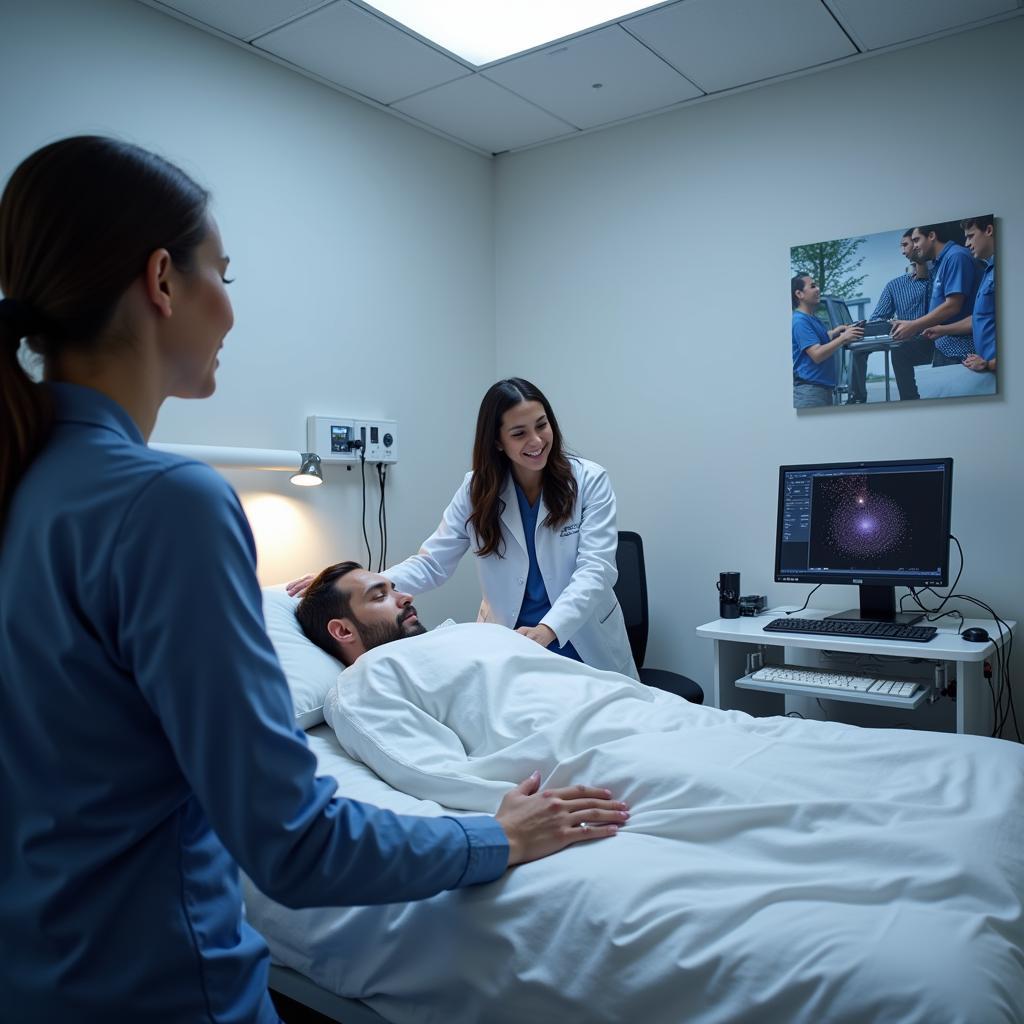Understanding the costs associated with a hospital sleep study can feel overwhelming. Many factors influence the final price, from insurance coverage to the specific tests required. This article aims to provide clarity on Hospital Sleep Study Costs, common influencing factors, and tips for navigating the financial aspect of your sleep health journey.
Why Hospital Sleep Studies Matter
Hospital sleep studies, also known as polysomnography, are crucial for diagnosing a variety of sleep disorders. These disorders, ranging from insomnia to sleep apnea, can significantly impact your overall health and well-being.
 Patient undergoing a hospital sleep study
Patient undergoing a hospital sleep study
During a hospital sleep study, medical professionals monitor your brain waves, heart rate, breathing, and other vital signs as you sleep. This comprehensive data allows them to pinpoint the root cause of your sleep problems and recommend the most effective treatment plan.
Factors Affecting Hospital Sleep Study Cost
While hospital sleep studies are invaluable for diagnosing and treating sleep disorders, it’s essential to understand the factors influencing their cost:
- Insurance Coverage: The extent of your insurance coverage plays a significant role. Some plans might cover a large portion of the cost, while others might require higher out-of-pocket expenses. It’s crucial to contact your insurance provider to verify your specific coverage details.
- Study Type: Hospital sleep studies encompass various types, each with varying costs. For instance, a standard overnight study typically costs less than a multiple sleep latency test (MSLT), often used to diagnose narcolepsy.
- Location: Geographic location can influence healthcare costs, and sleep studies are no exception. Costs might differ between urban and rural areas or even among different hospitals within the same city.
- Additional Tests: In certain cases, additional tests might be necessary alongside the sleep study. These tests, such as oxygen level monitoring or EKG, can contribute to the overall cost.
Navigating Hospital Sleep Study Costs
Managing the financial aspect of your sleep health doesn’t have to be daunting. Here are some tips to help you navigate hospital sleep study costs:
- Consult Your Insurance: Before scheduling your study, reach out to your insurance provider to confirm your coverage. Inquire about pre-authorization requirements, co-pays, and deductibles to avoid unexpected expenses.
- Discuss Payment Options: Most hospitals offer flexible payment plans or financial assistance programs. Don’t hesitate to discuss these options with the hospital’s billing department.
- Explore Alternatives: In certain situations, your doctor might recommend alternatives to a hospital sleep study, like a home sleep apnea test. These alternatives can be more cost-effective, especially for diagnosing obstructive sleep apnea.
 Doctor explaining sleep study costs to a patient
Doctor explaining sleep study costs to a patient
Making Informed Decisions
Prioritizing your sleep health is essential, and understanding hospital sleep study costs empowers you to make informed decisions. By taking a proactive approach, communicating with your healthcare providers, and exploring available resources, you can navigate the financial aspect of sleep studies effectively and focus on achieving restful, healthy sleep.
FAQs about Hospital Sleep Study Costs
1. Are home sleep studies cheaper than hospital sleep studies?
Home sleep studies are typically less expensive than in-hospital studies but might not be suitable for diagnosing all sleep disorders. It’s essential to consult your doctor to determine the appropriate type of study for your needs.
2. What if my insurance doesn’t cover the full cost of the sleep study?
If your insurance doesn’t cover the entire cost, inquire about payment plans or financial assistance programs offered by the hospital.
3. Can I get a sleep study without a doctor’s referral?
While it’s technically possible to get a sleep study without a referral in some cases, it’s highly recommended to consult your doctor first. They can assess your symptoms, recommend the appropriate type of study, and ensure your insurance covers it.
4. How long does it take to get the results of a hospital sleep study?
The time to receive results varies depending on the complexity of the study and the hospital’s workload. In most cases, you can expect to receive results within 7-10 business days.
5. What happens after I get my sleep study results?
Your doctor will review the results with you and recommend a personalized treatment plan based on the diagnosed sleep disorder.
For more information about sleep studies and costs, you can visit our Norwalk Hospital sleep center CT page.
Contact Us
If you have any concerns or require further assistance, please contact us at Phone Number: 02437655121, Email: [email protected]. You can also visit us at: No. 298 Cau Dien Street, Minh Khai, Bac Tu Liem, Hanoi, Vietnam. We have a 24/7 customer service team ready to assist you.